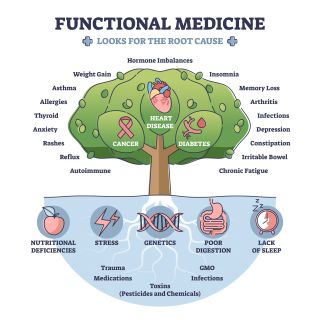Genetics
How Genetic Factors Contribute to Racial Health Disparities
Achieving health equality requires prioritizing diversity in genetic research.
Posted July 21, 2024 Reviewed by Hara Estroff Marano
Key points
- Genetic variation significantly influences health outcomes among different racial groups.
- Personalized medicine can address health disparities by tailoring treatments to genetic risk factors.
- Historical medical racism has led to mistrust and underrepresentation of minorities in genetic research.
- Increasing diversity in genetic studies is crucial for equitable healthcare advances.

Recently, the area of genetics has greatly transformed public comprehension of health and disease. Through the process of deciphering the genetic code, scientists have discovered vital data that assists in customizing therapies for each particular patient.
Genetic variations among racial and ethnic groups can have a substantial influence on health outcomes. That makes it crucial to examine how such variances affect personalized therapy. This article explores the impact of genetics on racial disparities in health and emphasizes the significance of integrating varied genetic information into healthcare.
Genetic variants, which are disparities in DNA sequences among individuals, have a significant impact on predicting vulnerability to certain diseases and reactions to therapy. For example, sickle cell anemia, a hereditary condition that impacts red blood cells, is a condition more common among individuals of African descent. The disorder produces intense pain, damage to organs, and heightened susceptibility to infection. Tay-Sachs disease predominantly impacts Ashkenazi Jewish people, resulting in neurological decline. Gaining a comprehensive understanding of inherent genetic conditions is of utmost importance in order to devise efficacious therapies and interventions.
Genetics and racial disparities significantly impact disease prevalence and treatment effectiveness. Genetic predispositions summarized in polygenic risk scores reveal racial inequities in cardiovascular disease (CVD) outcomes. Black individuals of British heritage have higher CVD vulnerability, emphasizing the need to incorporate genetic data in treatment decisions. African American communities experience higher CVD death rates but are often excluded from clinical studies. Structural racism and discrimination exacerbate health disparities through stress-induced physiological dysregulation, or allostatic load.
Genetic lineage also affects breast cancer treatment toxicity, with women of African heritage more prone to severe toxicities. Addressing racial disparities in healthcare requires integrating genetic knowledge, improving healthcare delivery systems, and conducting targeted healthcare trials.
The significance of personalized medicine lies in its objective to customize therapy based on the unique data of each patient. Healthcare providers can utilize genetic information to forecast patients' response to particular medications, identify those susceptible to specific diseases, and create precise treatments.

Pharmacogenomics, a subdivision of personalized medicine, investigates the impact of genes on an individual's reaction to medications. Its use has demonstrated potential in the treatment of diseases like cancer, where genetic abnormalities might inform the choice of the most efficacious medicines. Personalized medicine has the ability to alleviate health inequities in minority populations by offering customized interventions that take into account genetic risk factors.
The Human Genome Project and related initiatives, such as the International HapMap Project, have emphasized the significance of incorporating a wide range of people in genetic research. These projects have surveyed genetic variances among many racial and ethnic groups, yielding valuable data for the development of tailored treatments. Nevertheless, there is still a significant amount of work that has to be accomplished in order to guarantee that all populations have access to the advantages of personalized medicine.

Although customized medicine holds great potential, there are some obstacles to be overcome. Due to the historical prevalence of medical racism, numerous minority communities exhibit caution when it comes to engaging in genetic research. The unethical Tuskegee Syphilis Study diminished confidence in the healthcare system. To address the lack of trust, it is crucial to include communities using culturally sensitive methods and open and honest communication.
The lack of proportional representation of minority populations in genetic studies harms everyone but especially restricts the relevance and generalizability of study findings to these specific groups. Enhancing the variety of genetic research can guarantee that personalized therapy is advantageous for all populations.
To effectively convey the value of genetic testing and customized treatment, providers must possess an understanding so as to demonstrate respect for the cultural backgrounds and beliefs of their patients. Training and educational programs have the potential to augment cultural competence and promote patient-provider relationships.
Customized healthcare programs have significantly improved health outcomes for minority communities. The International HapMap Project, which mapped human genetic diversity, provided valuable insights into disease mechanisms by including diverse populations. Dr. Rick Kittles' African American Hereditary Prostate Cancer (AAHPC) project examines genetic risk factors in African American men, underscoring the importance of diverse genetic data in research.
Black scholars have made substantial contributions to genetics and healthcare. Dr. Kittles has advanced understanding of genetic susceptibility in minorities. Dr. Charles Rotimi has studied genetic diversity and health inequities, providing key insights. Dr. Janina Jeff focuses on genetic risk factors in minority communities and advocates for diversity in research, highlighting the importance of representation and fairness in science.
The advance of customized medicine depends on technologies like gene editing and AI to improve healthcare. Ensuring that advances benefit all demographics is crucial. Policymakers and researchers must support diverse genetic studies, protecting participants' rights and privacy. Community involvement and ongoing education are vital for building trust and ensuring personalized medicine's success.
Genetic and epigenetic studies are key to addressing racial health disparities. Healthcare professionals can improve therapies by recognizing genetic differences among racial and ethnic groups. Achieving health equality requires prioritizing diversity in genetic research, engaging communities with cultural competence, and promoting inclusive policies.
References
Ballinger, T. J., Cunningham, G., Wu, X., & Schneider, B. P. (2020). Impact of genetic ancestry on treatment toxicity and racial disparities in breast cancer. Current Breast Cancer Reports. https://doi.org/10.1007/S12609-020-00369-W
Bose, A., Platt, D., Kartoun, U., Ng, K., & Parida, L. (2023). Role of genetics in capturing racial disparities in cardiovascular disease. medRxiv. https://doi.org/10.1101/2023.02.10.23285769
Carlos, R. C. (2023). Social genomics model of health disparities. Journal of the American College of Radiology. https://doi.org/10.1016/j.jacr.2023.06.001
Chahine, M., Fontaine, J. M., & Boutjdir, M. (2022). Racial disparities in ion channelopathies and inherited cardiovascular diseases associated with sudden cardiac death. Journal of the American Heart Association. https://doi.org/10.1161/JAHA.121.023446
Jeff, J. M., et al. (2018). The importance of diversity in genomics research. Nature Reviews Genetics, 19(7), 412-413.
Kittles, R. A., & Weiss, K. M. (2003). Race, ancestry, and genes: Implications for defining disease risk. Annual Review of Genomics and Human Genetics, 4(1), 33-67.
Rotimi, C. N., & Jorde, L. B. (2010). Ancestry and disease in the age of genomic medicine. New England Journal of Medicine, 363(16), 1551-1558.
Wagner, I. M., Xuan, Z., Lu, H., & Wang, C. (2023). Racial disparities in accessing care along the continuum of cancer genetic service delivery. Cancer Epidemiology, Biomarkers & Prevention. https://doi.org/10.1158/1055-9965.epi-23-0596




